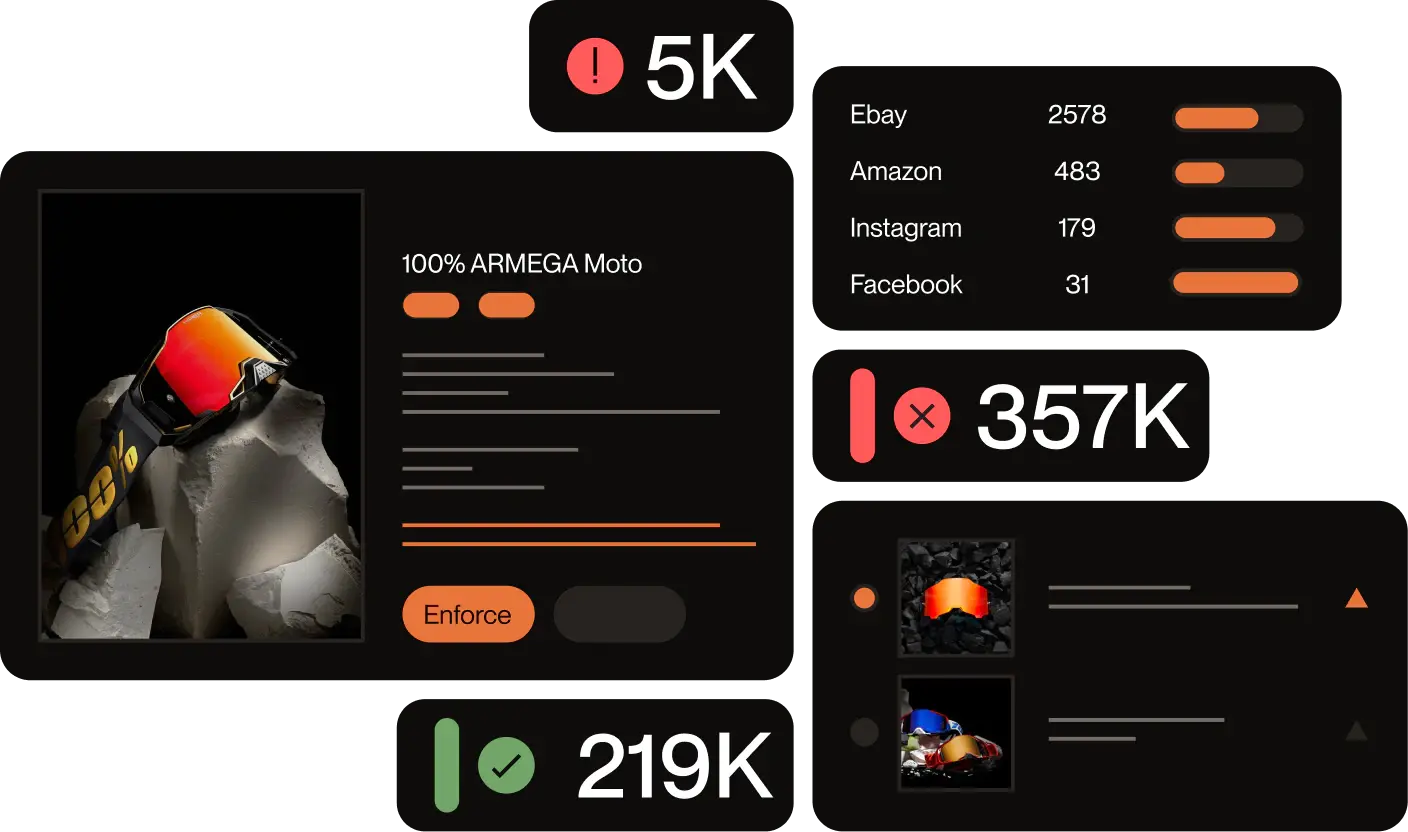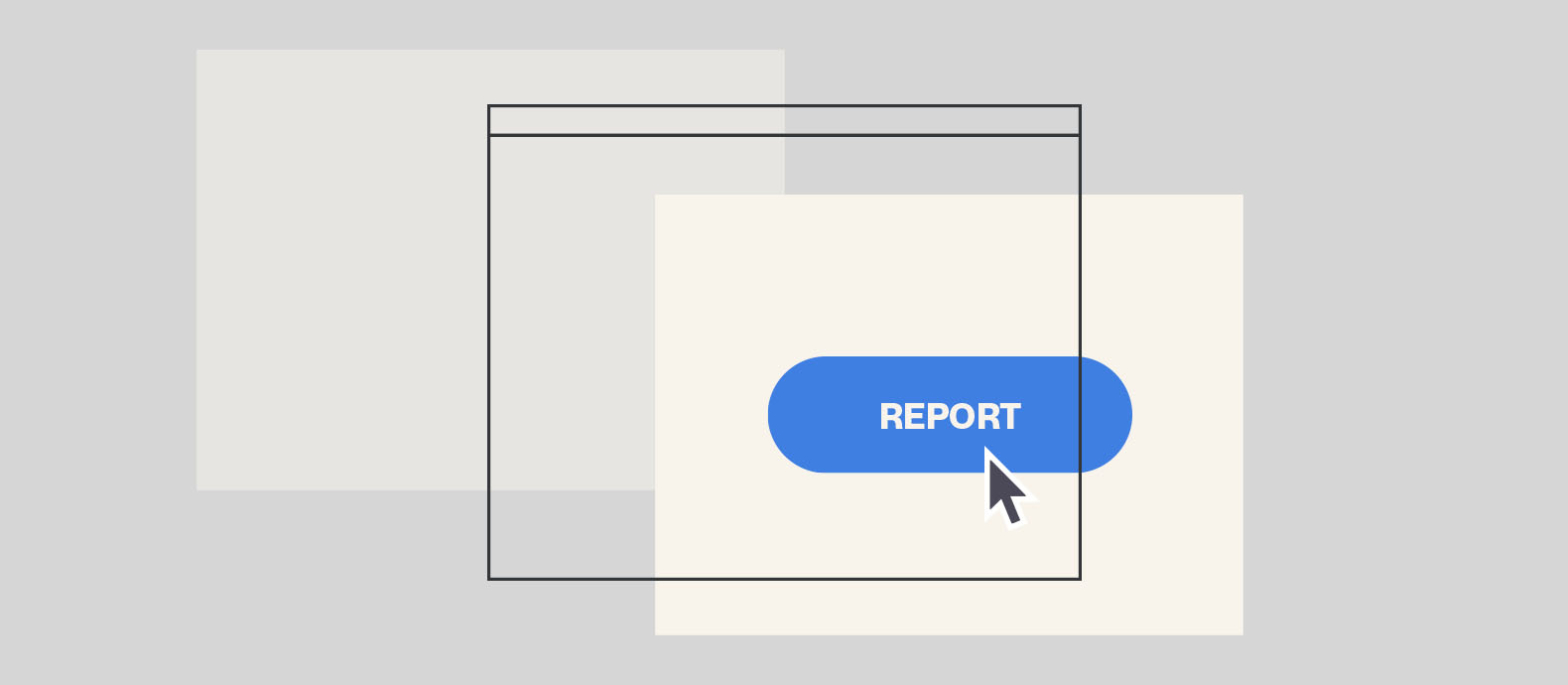Are you concerned that scammers might be duplicating your website to deceive your customers?
From phishing attempts to counterfeit product sales, duplicate websites pose serious risks.
Disappointed customers often voice their frustrations publicly, which can deter potential buyers and amplify the damage.
The challenge lies in how to find these duplicate sites quickly and effectively. While there are manual methods available, they can be time-consuming and often fail to keep pace with the growing threat.
At Red Points, we’ve seen website infringements surge by 161% since 2022, reflecting the increasing sophistication of online scams. Our AI-powered brand protection software combats this trend by scanning for infringing sites and taking them down—74% of takedowns happen seamlessly coupled with the expertise of our world-class team of experts.
If you’re ready to protect your brand from fake websites, keep reading to learn effective strategies for identifying duplicates and how Red Points can help you stay ahead of the curve.
How to detect duplicate websites
Automated software that detects and takes down duplicate websites
The more successful your brand is, the more you will have to fight off scammers trying to impersonate your business. Cybercriminals can be operating from any part of the world at any hour, and chasing them is a 24/7 job. Red Points Domain Takedown Service automatically detects and requests the take down of the offending and duplicate websites before fraudsters have time to start siphoning away your profits and degrading your brand image.
American footwear brand KEEN dealt with this issue. The brand went from zero to 1,400 customer complaints in a day after scammers set up a fake site and ran Facebook ads that copied KEEN’s content. The company’s reputation was on the line as customers were unknowingly giving personal information to a scam website. KEEN partnered with Red Points to discover and remove fake sites at scale. Red Points’ AI-powered system covered 1,000 domains with an enforcement rate of 93.5%.
Conduct a domain search
To find out whether your website has been duplicated, you can conduct a similar domain name search. There are two ways you can do this. Firstly, you can use the ICANN domain name lookup tool. Type in your domain name and similarly written domain names (for example yourdomain.com and yourdomain.net). Investigate any domains that look similar to yours.
The other way is to simply type in different URLs into the search bar. As above, type in yourdomain.com and yourdomain.net, for example. Try typoed versions, such as yourdoman.com. If you find something, it could be a duplicate website.
Use the Google search engine
To detect duplicate websites, Google is your friend. Find a blog post or other content on your website, copy around ten words from the beginning of a sentence.
Paste the ten words into Google’s search bar surrounded by quotation marks.
Select enter. If more than one result shows up, then it’s likely to be duplicate content.
You can also repeat this technique with Bing, Brave Search, DuckDuckGo, and Yandex since these all maintain different page indexes.
Of course, that duplicate content could come from somewhere else on your own website, which is why it’s always important to create original content – otherwise, your SEO takes a hit.
If the results page includes other websites, whichever result is first is the one that Google thinks is the original content.
Monitor trackbacks and use Google Webmaster tools
Often when you write search engine optimized articles, you will include links to other articles or pages in your website. Every time an outside source links to your website, you should get a notification about the trackback.
You can also use Google Webmaster tools. Make sure to check these trackbacks, because sometimes they could be coming from people simply copying and pasting your content. This isn’t foolproof, however. Many scammers will delete the links in the text so that you won’t be alerted.
Set up Google Alerts
Google Alerts is a free tool whereby Google will alert you of content you are interested in. You can also get an alert if any of the titles of your blog posts appear online after your content has already been created. It could be a coincidence, or it could be more insidious.
Why and how do scammers duplicate websites?
Duplicated websites are also known as domain spoofing, phishing sites, and even lookalike “copycat” websites. Cybercriminals copy several identifying features of your website, such as the logo, domain name, and written content, to dupe customers into believing that they are sharing their personal login details or spending their money with a trusted company.
In general, there are three outcomes of a scammer duplicating your website:
- To sell counterfeit goods
- To create phishing websites,
- To develop fake security websites that install malware onto users’ computers.
Content can also be copied by legitimate, albeit unscrupulous, businesses or bloggers looking for an effortless way to get their page to rank more highly on Google.
The more of an authority your business is on certain topics, the more likely your content will be copied by lazy website owners and bloggers.
Here are a few ways scammers duplicate websites:
- Copy identifying elements of your website: The scammer will begin by copying the identifying elements of your website, such as your logo, the layout, your product listings if you’re an ecommerce site, and your content.
- Spoofing your domain name: Scammers use typosquatting and cybersquatting to make a domain name that’s similar to yours. Someone scamming Adidas might use “Addidas” as the domain name, for example, since it’s a common misspelling.
- Attract people: The scammer will get people to their site through SEO, social media, email, ads, and text messaging. Cybercriminals may also use black hat SEO techniques to rank on Google. The very fact that they rank on page 1 or 2 of Google means that they appear to be trustworthy companies.
How to check if your website has been copied
Now, let’s take a closer look at how to tell if a website has partially copied your content. Perhaps it copied some of your text or images. Here’s what you can do:
- Search Google: You can copy a sentence or paragraph and do an exact search in Google with quotations. You’ll see if other sites use that section of text.
- Use a plagiarism checker: You can use tools like Copyscape or Originality.ai to check for plagiarism on other websites.
- Reverse image search: To look for images like product photos or ads you’ve created, insert the image in Google’s reverse image lookup tool. The results will show you other sites that have published the image, and you’ll recognize if any site is unauthorized.
- Try an AI tool: If you have access to an AI chat service like Chat GPT that can browse the internet, you can create a prompt to have it check for your content. For example, your prompt could say “Tell me if you find this exact text on any website [insert text in quotations]”. You’ll see your website and others that have the same content. This works reasonably well though it isn’t a foolproof way of finding all copied text since it depends on what the AI can search for.
This type of manual searching plays a role since it can confirm your suspicions of duplicate content. But it takes a long time to uncover individual sites, and you may miss new ones once you stop searching. That’s why it can be helpful to leverage a platform like Red Points that searches for your content around the clock.
How to tell if a website is cloned
You can use a few different techniques to detect if your website has been fully cloned. The site will likely copy everything about yours including metadata and scripts. Here are a few signs to look for:
- Duplicate or similar domain names: Look for your domain name with different top-level domains like .online, .shop, .net, or .info.
- Unusual traffic patterns: You might notice a drop in traffic if a fake site comes online and steals a portion of your customers.
- Similarities in the code: Besides seeing your content in text or images, you can often find your source code copied entirely on cloned sites. This includes your internal links, so you’ll see a spike in internal links from an unreputable site.
- Increase in customer complaints: As customers fall for the scam, they might complain on your site that they never received a product or received a fake item. Many of these customers can blame you for the issue, which is why it’s so important to fix it quickly.
These signals of a cloned site can be a bit tougher to detect, and you might not be an expert in reading code or looking up domain names. That’s alright because Red Points’ solutions can detect cloned sites by analyzing metadata, domain registrations, copyright images, trademark infringements, and other key indicators in real-time.
Best duplicate website checkers
Here are a few of the tools you can use to check for duplicate website content outside your site:
Copyscape
With Copyscape’s free version, you can search for duplicate versions of your home page and other pages elsewhere on the web. You can get a paid membership to batch search up to 10,000 URLs at once. Copyscape will display where duplicate content exists.
Dupli Checker
Dupli Checker’s plagiarism checker lets you scan a page and compare it to others on the net. You’ll see if any sites have the same content. This tool only lets you scan one page at a time.
Originality.ai
Originality.ai offers a free plagiarism checker. You can search for duplicate sites by entering your home page or about page content. However, the free version only shows one duplicate site. If more than one site has stolen your content, you’ll have to get a paid plan.
Red Points
The options above can be useful but they require you to manually scan your page, and they don’t update you over time if new sites copy your content. On the other hand, Red Points’ bot search capability is always looking for your content. This is especially helpful since fake sites tend to appear for a short time, scam customers, and disappear.
What to do if your website gets duplicated
If you do detect a duplicate website that is infringing on your copyright and trademark, there are many ways you can go about reporting it. Below is a selection of Red Points guides on how to take down duplicate websites:
- This step-by-step guide explains how to take down a fake website through cease and desist letters.
- You can report duplicate websites to Google
- While your intellectual property is automatically trademarked upon creation, it’s always worthwhile officially trademarking your brand, so you have sufficient legal grounds to eradicate infringing material.
- The same goes for copyright: if other websites are copying your content, you will be better protected if you have officially copyrighted your website.
- If your business is in ecommerce, you can learn about how to report a fake online store with this guide.
- If the website has simply copied a blog post, and it’s a successful business, use this as a marketing opportunity for your brand. Instead of asking them to take the content down (which you are well within your rights to do), ask for credit and a link to your website.
How to prevent duplicate websites from stealing your content
1. Register your intellectual property (IP): As stressed above, if you register your website for copyright and trademark, it gives your brand extra protection, particularly in legal terms. These added protections also speed up the process of getting a website taken down, and time is of the essence when it comes to fraud.
2. Display trademark and copyright notices: You can display your copyright and trademark protections on your website to deter any bad actors.
3. Encryption: You can encrypt the code on your website. This means that scammers are unable to view your code and provides an extra layer of protection.
4. Disable the copy/paste function: While this isn’t foolproof, disabling copy and paste is an added barrier for unscrupulous copycats.
5. Monitor the web: Make sure your business always has one eye open for copycats. The best, surest way to do this is to install a domain takedown service. Red Points Domain Monitoring Software is an easy, stress-free alternative that proactively scans the net, sniffs out bad actors, and gets them taken down before damage is done to your brand.
What next?
When someone copies your website, your reputation suffers as customers fall for scams and blame your team. Bad actors continue to use this technique for their gain as we’ve seen the number of infringing websites grow by 37% over the last quarter.
You might think the issue is a rogue website here and there, but duplicate websites can easily proliferate.You can detect duplicate websites manually in a few ways like using plagiarism checkers and looking for similar domain names to yours.
For a better use of your time, you can leverage Red Points’ brand protection platform to take down fake websites automatically. The system will work behind the scenes to locate scam sites taking advantage of your brand and remove them.
Reach out for a demo today to see how Red Points can get rid of infringing sites.







